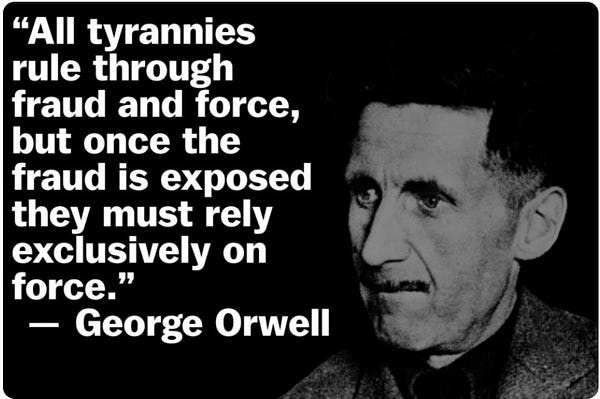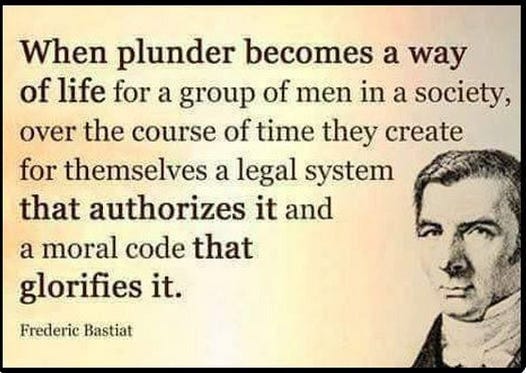Today’s Contemplation: Collapse Cometh CXXVIII
Our Banking System: Government Verses Private Control, Part 3
May 10, 2023 (original posting date)
Our Banking System: Government Verses Private Control, Part 3
In Part 1 of this now 4-part Contemplation I lay out the case that having our governments take over our banking system through nationalisation would not serve the interests of most people any better than the private interests that currently run them. This is primarily because both government and private corporate interests are part and parcel of a ruling caste in a large, complex society that functions to protect/extend the ruling elite’s control of systems that provide their revenue streams over all other concerns.
In Part 2, I explain why with the increasing recognition that humanity’s expansion has limits imposed by existence upon a finite planet has led to demands to have our sociopolitical systems lead society on a managed path away from environmentally-destructive industries, particularly fossil fuels, in order to ‘decarbonise’ civilisation. This societal ‘request’ is then leveraged by the ruling caste to expand not only their revenue streams but also their activities of legitimisation that serve to help establish moral validity for their privileged positions atop any large, complex society’s power and wealth structures.
This is accomplished in a number of ways but one of the more recent ones is via manipulation of the narratives that surround relatively new industrial products (i.e., ‘clean/green’ energy technology). The primary reason for this is because it is the ruling caste who owns/controls these industries and the political wing of this class is marketing this ramped up production as the means of addressing the issues raised by the masses — they are being responsive and representative by pursuing and enforcing an environmentally-sound, carbon-free/-reduced path that benefits everyone and the planet.
The inconvenient facts surrounding such policies are hidden, denied, and/or rationalised away, mostly through intense ‘greenwashing’. That this propaganda is beginning to be seen through and increasingly requiring mandated legislation to bring about the shift speaks volumes about the tendency of the ruling elite to use force when narrative management breaks down.
It’s been argued by some that the ruling caste often creates the demand/crisis they want to ‘solve’ — ‘solutions’ that invariably benefit their loosely-affiliated class far more than broader society. While there may indeed be some, or a lot, of this ‘problem-reaction-solution’ based upon manufactured ‘crises’ occurring, I believe it’s more likely that the saying “Never let a good crisis go to waste” is reflected in what regularly occurs (a saying attributed to and used by several people, including Niccolo Machiavelli, Winston Churchill, Franklin Delano Roosevelt, and Saul Alinsky).
Our ‘leaders’ see opportunity in crises and leverage them to help meet their primary motivation: control/expansion of the wealth-generation/-extraction systems that provide their revenue streams and thus positions of power, privilege, and prestige. Further, I believe the elite take advantage of far more than simply crises to implement wanted change.
It’s not a stretch to argue that it’s virtually any and everything that gets used to aid in the introduction and funding of projects/policies/initiatives/etc. that exploit national treasuries/resources to feed the various ruling caste revenue streams directly and/or indirectly — and help to keep the various Ponzis/scams/schemes/flim-flams/etc., sustained.
Simply twist/market the situation/issue in a way that describes the need and how to address it, highlight the benefits of the sociopolitical solution for society-at-large or some perceived disadvantaged group, and then introduce legislation to make it happen. Money then begins/continues to flow into the proposed ‘solution’, often (if not always) finding its way into the accounts of favoured businesses/institutions/financial supporters/expanded bureaucracies/family members/etc..
“…the State obtains its revenue by the use of compulsion; that is by the use and the threat of the jailhouse and the bayonet. Having used force and violence to obtain its revenue, the State generally goes on to regulate and dictate the other actions of its individual subjects…”
-Murray Rothbard (1974) Anatomy of the State
It’s perhaps important here to be reminded of what anthropologists/sociologists argue about the social stratification that occurs within any complex society, a society’s elite, and development of sociopolitical systems.
There exist two basic schools of thought as to how/why political systems/the State arose in complex societies and the role of a privileged class within them.
Despite their differences, both of these interpretive schools assume complex societies developed as a means of problem-solving for an increasingly large population and required some form of organisational system to help coordinate growing complexities, such as resource distribution and potential intra-/inter-societal conflict. The disproportional access to/control of resources that accompanies this role gave rise to growing inequity that benefited a minority of citizens via the power and privilege inherent in this arrangement.
While the Integrationist school (also known as Functionalism) argues this privilege/power is the ‘reward’ for organising systems that benefit society as a whole, the Conflict school counters that this situation serves to reinforce and expand the ruling caste’s influence and control over the masses as a means of mostly benefiting themselves.
Regardless, these two perspectives both hold that a society’s rulers promote activities (e.g., symbolic manipulation to foster moral validity, coercive sanctions to ensure compliance) that serve to maintain and legitimise their positions of power and privilege. It would seem to me that the ruling caste very much wishes the Integrationist perspective to be the one disseminated through and accepted by society as it provides moral validity for their positions atop the wealth and power structures inherent in all large, complex societies: it supports status quo arrangements that benefit them and their families.
All of the above is made possible in a number of ways but primarily through the control of the social stories that circulate in a society — the preferred path by a ruling caste who find it both more efficient and powerful than the far more coercive means they can and do on occasion employ (especially for those on the margins that reject the ruling caste’s narratives). These mostly widely-accepted (and typically unquestioned) social narratives provide the moral validity that helps them to remain in their positions atop society’s power and wealth.
The mechanisms for propagating these sociocultural stories range from political speeches[1], to mass media[2], to the co-opting of dissenting voices[3], and to control of the education systems; as well as a number of other ways for spreading the message[4] far and wide.
The conscious and intelligent manipulation of the organized habits and opinions of the masses is an important element in democratic society. Those who manipulate this unseen mechanism of society constitute an invisible government which is the true ruling power of our country.
We are governed, our minds molded, our tastes formed, our ideas suggested largely by men we have never heard of. This is a logical result of the way in which our democratic society is organized. Vast numbers of human beings must cooperate in this manner if they are to live together as a smoothly functioning society.
-Edward Bernays (1928) Propaganda
Throw on top of our cultural stories the numerous psychological mechanisms that impact reception of these messages (e.g., our tendency to defer to/obey/trust experts/authority; groupthink; cognitive dissonance reduction) and we have a perfect storm of susceptibility to not only being taken advantage of by the dominant story-telling apes in our societies, but embracing them and their narratives. We accept these tales with nary a second thought, denying/ignoring evidence that challenges them.
Two overlapping messages appear to be quite common amongst our ruling elite in recent times (especially and repeatedly shouted by the supportive priesthood of economists, government bureaucrats, the mass media, and certain academics): growth is necessary and only beneficial for society[5]; and, this growth can proceed virtually unhindered if we simply shift from our carbon-intense, fossil-fuel energy base to a broad electrification of everything using ‘green/clean’ energy production[6].
On top of this marketing extravaganza that pushes ‘green/clean’ energy products as the panacea for needing to transition away from dirty and carbon-intensive fossil fuels, we must pile on the issue that all debt-/credit-based fiat currencies (in fact, all forms of ‘money’) are fundamentally potential claims on future resources — fundamentally energy[7]. This is a very significant problem upon a finite planet encountering quickly and significantly increasing diminishing returns on all resources but especially energy[8].
These claims have been building exponentially for several decades (if not longer, perhaps since the first goldsmiths introduced depository notes and created the beginnings of ‘fractional reserve banking’). The primary reason for all these claims appears to be in response to governments needing to fund expansion that, when push comes to shove, is about meeting the ruling elite’s main goal of controlling/expanding revenue streams which they do by pushing/maintaining the wealth-extraction/-generation systems they control (e.g., taxation, economic growth, debt/credit expansion, industrialisation, energy-averaging systems, food production and distribution; etc.).
Throughout pre/history one of the actions by the governing elite to aid their attempts to sustain/expand their power in and control upon society is to increase the ‘wealth’ that is needed to support those activities that ensure their revenue streams: military/security, bureaucracies, trade, social programmes, etc.. By controlling specific aspects of a society’s economic system, this can be accomplished relatively easily and mostly behind a curtain where virtually no one understands or is aware of the manipulations going on.
If you’ve made it to the end of this contemplation and have got something out of my writing, please consider ordering the trilogy of my ‘fictional’ novel series, Olduvai (PDF files; only $9.99 Canadian), via my website or the link below — the ‘profits’ of which help me to keep my internet presence alive and first book available in print (and is available via various online retailers).
Attempting a new payment system as I am contemplating shutting down my site in the future (given the ever-increasing costs to keep it running).
If you are interested in purchasing any of the 3 books individually or the trilogy, please try the link below indicating which book(s) you are purchasing.
Costs (Canadian dollars):
Book 1: $2.99
Book 2: $3.89
Book 3: $3.89
Trilogy: $9.99
Feel free to throw in a ‘tip’ on top of the base cost if you wish; perhaps by paying in U.S. dollars instead of Canadian. Every few cents/dollars helps…
https://paypal.me/olduvaitrilogy?country.x=CA&locale.x=en_US
If you do not hear from me within 48 hours or you are having trouble with the system, please email me: olduvaitrilogy@gmail.com.
You can also find a variety of resources, particularly my summary notes for a handful of texts, especially Catton’s Overshoot and Tainter’s Collapse: see here.
It Bears Repeating: Best Of…Volume 1
A compilation of writers focused on the nexus of limits to growth, energy, and ecological overshoot.
With a Foreword and Afterword by Michael Dowd, authors include: Max Wilbert; Tim Watkins; Mike Stasse; Dr. Bill Rees; Dr. Tim Morgan; Rob Mielcarski; Dr. Simon Michaux; Erik Michaels; Just Collapse’s Tristan Sykes & Dr. Kate Booth; Kevin Hester; Alice Friedemann; David Casey; and, Steve Bull.
The document is not a guided narrative towards a singular or overarching message; except, perhaps, that we are in a predicament of our own making with a far more chaotic future ahead of us than most imagine–and most certainly than what mainstream media/politics would have us believe.
Click here to access the document as a PDF file, free to download.
[1] See this, this, this, this, and/or this.
[2] See this, this, this, this, and/or this.
[3] See this, this, and/or this.
[4] See this, this, and/or this.
[5] See this, this, this, this, and/or this.
[6] See this, this, this, and/or this.









